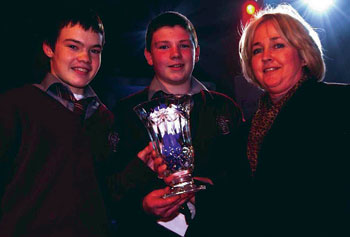| 2003 |

|
YEAR BOOK |
Christian Brothers' School, Ennistymon, Co. Clare
|
Diet and regular soft drinks; do they cause physical damage to our teeth?
|

We tested six different soft drinks on teeth in the laboratory for a period of two weeks. We used a cola, a diet cola, a colourless drink, a colourless diet drink, sparkling water, and still water as our samples. We asked our local dentist for some sample teeth that we used in our experiment. He supplied us with six adult eye teeth with no fillings or cavities. Before we started the experiment we measured the density of all the teeth. After the two weeks were up, we measured the densities of the teeth again. All the teeth showed a change in density, including the tooth in tap water. The teeth in cola and diet cola showed the biggest change and both had turned black. The teeth in the colourless drink and diet colourless drink showed the next biggest change, but had not turned black. Sparkling water showed a small change and tap water a minute change. We then placed the teeth in a solution containing disclosing tablets to check if they had plaque on their surface. All the teeth indicated that they had plaque on their surfaces. The black teeth from the cola and diet cola showed lots of plaque as did both the colourless drinks. Sparkling water showed a small amount of plaque and tap water a tiny amount.
We conducted a survey on our peers, second year students. This survey showed that in an average day we drank 1.42 cans or approximately 469 millilitres of soft drinks. It showed that we visit the dentist 2.24 times a year and have on average 1.64 fillings and 1.15 teeth extracted. These fillings and extractions may not be due entirely to soft drink consumption.
Patrick Conway & Gerry Considine entered their project in the Junior Group Section in the Social & Behavioural Sciences Category at the Esat BT Young Scientist & Technology Exhibition in January 2003. They won a Special Award presented by the Dental Health Foundation.
Their teacher was Ms Mary Lyons.
|
|